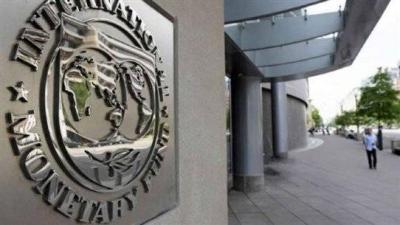The visit of the International Monetary Fund (IMF) delegation to Lebanon concluded yesterday with a very negative signal regarding the delays in implementing the preconditions required by the Fund to finalize the staff-level agreement and convert it into a final agreement. In a statement issued after the visit, the Fund noted that reforms are progressing very slowly, but in closed meetings, it criticized the shortcomings of the Parliament and the multiplicity of entities involved in the reform and restructuring program, clarifying that this path is leading Lebanon towards an increasingly dire and costly situation each day. The Fund's delegation closed its tour in Lebanon with a visit to President Michel Aoun. During the meeting, delegation head Ernesto Ramirez expressed his dissatisfaction “with the ambiguity surrounding the government's financial reform program, particularly regarding the acknowledgment of losses and the protection of small depositors’ deposits.” The Fund believes that Prime Minister Najib Mikati's plan is constantly being amended, but it considers that “the performance of the government and Parliament is disappointing and shocking,” as it expected their work to be “more dynamic and to implement real reform, especially concerning bank secrecy laws and the restructuring of the Central Bank of Lebanon and the zombie banks to restore confidence in the banking sector,” according to informed sources.
The delegation focused on the necessity of acknowledging the losses, which have not yet occurred. They indicated the need “to disclose the financial losses to the public, and that part of the deposits has vanished and writing them off is the entrance to any reform and should precede any plan or law.” Moreover, procrastination and waiting for the losses to extinguish over time “will not solve the problem but will exacerbate it and increase the tragedies of the Lebanese through further impoverishment.” The delegation informed Aoun that the Fund would continue to pressure the entities “we hold responsible for diluting and deliberately delaying.” According to sources, the Fund's delegation praised Aoun for rejecting the amended bank secrecy law passed by Parliament, emphasizing the need to “correct the deficiencies in it.”
The Fund had previously met with the head of the Finance and Budget Committee, MP Ibrahim Kanaan, and with the head of the Administration and Justice Committee, MP George Adwan. The Fund inquired about the delays in enacting the reform laws, to which both attributed the delays to the government's reform plan, which should be clear and comprehensive. This is what Adwan stated in a press conference held after the meeting, confirming their unwillingness to approve “formal and superficial laws required by the IMF or others […] without a budget with erroneous figures for only three months remaining in this year […] while the most important details, including how we will enter into capital control and how we will exit from it, in what manner and over what time period, and when we will return funds to depositors whether small or large, are missing.” According to sources, the delegation stressed the necessity of unifying the exchange rate and linking it to the Sayrafa platform, expressing surprise at the continued multiplicity of exchange rates, which has not occurred in any country in the world, no matter how severe its crises.
In its final statement, the Fund indicated that the Lebanese economy is experiencing stagnation, with the Central Bank's foreign currency reserves declining, and the exchange rate in the parallel market rising to 38,000 Lebanese pounds against the dollar, and a contraction in GDP by 40% compared to 2018. This occurs alongside “Lebanon's failure to implement the agreed-upon reforms in the memorandum signed between the government and the IMF, as most laws have not been approved, including the 2022 budget law.” The Fund demanded that the 2022 and 2023 budgets be approved at an exchange rate based on the Sayrafa platform as a basis for improving revenues. The multiplicity of exchange rates harms the economy and enhances corruption and rent-seeking, as well as putting pressure on mandatory reserves. Therefore, it is essential to proceed with the approval of the capital control law. Regarding the bank secrecy law, the statement noted that the version approved by Parliament included positive steps but did not meet the necessary amendments to align with the best global standards. It welcomed the Parliament's review of some fundamental deficiencies to combat corruption and requested the implementation of the government’s financial program and acknowledgment of substantial financial losses and their prior treatment while respecting the hierarchy of responsibilities and the necessity of providing comprehensive protection for small depositors, indicating that the use of state assets in this context should be “limited.” The IMF Board is awaiting the completion of all these requirements to consider Lebanon's request to enter into a financial program with it.
### Additional Amendments Needed to Bank Secrecy Law
President Michel Aoun was informed by the IMF delegation that the latter “has proposed a set of suggestions to Parliament members to consider when redrafting amendments to the bank secrecy law.” However, parliamentary sources stated that the delegation's remarks involved “allowing the financial administration to access banking accounts,” noting that this observation should be discussed in detail in the middle of next week with the legal department at the Fund, especially since some MPs believe that such an amendment infringes on depositor privacy and grants any employee in the financial administration the authority to extort clients. Meanwhile, the delegation views this as a necessity and a common practice in all countries that does not violate any privacy, but rather contributes to reform and combating corruption.




